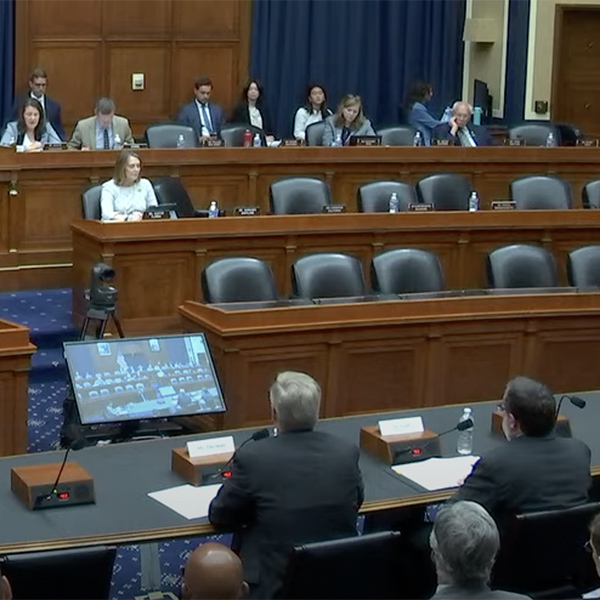
The House Energy and Commerce Subcommittee on Energy, Climate and Grid Security took testimony on 15 bills aimed at promoting advanced nuclear plants.
The House Energy and Commerce Subcommittee on Energy, Climate and Grid Security took testimony Tuesday on 15 bills aimed at promoting advanced nuclear plants.
“Our goal is to advance durable and bipartisan policies that will expand nuclear energy and its many benefits for the nation,” said subcommittee Chair Jeff Duncan (R-S.C.). “Policies that make sense for the regulation of nuclear power today, and the new technology is expected to seek licensing and deployment in the coming years.”
Ranking Member Diana DeGette (D-Colo.) said the U.S. can be both a leader in new nuclear technology and regulations that ensure its safety. The Nuclear Regulatory Commission is expected to start formally processing new applications for new reactor designs in the coming years, but it needs to staff up to get that work done efficiently and effectively, while one-third of its staff is eligible for retirement.
“This expected attrition, in addition to the anticipated increase in reactor applications, creates a challenge for the NRC as it completes this work,” DeGette said. “And that’s why I introduced the Strengthening the NRC Workforce Act of 2023.”
The bill would authorize the NRC chair to make hires when the agency is generally short-staffed or needs to replace key employees. The bill is modeled on similar legislation that Congress approved for FERC in 2020, and Democrats also support another bill that would set up an Office of Participation at NRC, which again is modeled on FERC’s office.
Michael Goff, principal deputy assistant secretary of the Department of Energy’s Office of Nuclear Energy, said his agency has no opinion on any of the bills the committee is considering — but the Biden administration shares some of the same goals as the legislators.
“The Biden-Harris administration is prioritizing activities that keep the existing fleet of nuclear power plants in operation, that deploy advanced reactor technologies, that secure and sustain the nuclear fuel cycle, and that expand international nuclear energy cooperation,” Goff said.
Nuclear energy is important to getting the grid to zero emissions by 2035 and the overall economy to net zero by 2050, he said.
Strategic Nuclear Investments
A major issue now is that the U.S. nuclear industry is still highly dependent on Russia for fuel, getting 24% of its uranium from there last year despite its invasion of Ukraine, Goff said. Combined with imports from Kazakhstan and Uzbekistan, countries in Russia’s sphere of influence provide about half of the total nuclear fuel in the U.S., Rep. Bob Latta (R-Ohio) said.
“Expanding our domestic fuel capacity will require strategic investments coupled with import restrictions that protect those investments well into the future,” Goff said. “We must act swiftly to support domestic enrichment capabilities and prepare our industry for this transition. The department welcomes the opportunity to work with Congress to address this national security vulnerability.”
The NRC is gearing up to review new reactor designs and expects four applications to actually start building new plants, and if those are successful, it will take more applications going forward, said agency Executive Director of Operations Dan Dorman.
“As industry is developing new and advanced reactor designs, our staff is reviewing pre-application materials and submitted applications commensurate with the risk and safety significance of the proposed technology,” Dorman said.
NRC staff has submitted a pending proposal that would update the regulators’ review process to deal with the new designs, but some on the committee and in the industry have questioned whether it goes far enough.
“It’s not at all clear that NRC is performing its safety mission and service to the broader mission to enable nuclear energy,” Duncan said.
NRC staff talk about its mission as “enabling the safe and secure use of nuclear technology,” and the agency has been working to consider risks of different proposals up front so the proper amount of resources can be applied in different cases, Dorman said.
“There’s one critical point that I hope that this committee will take away from my testimony today: It is that we are not going to develop an innovative advanced nuclear sector capable of meeting our energy security and climate objectives if we don’t fix the Nuclear Regulatory Commission,” said Breakthrough Institute Executive Director Ted Nordhaus.
Congress has long recognized the importance of nuclear plants to the country’s economic welfare, but the regulatory agency is more narrowly focused on the safety of the plants themselves, he added. NRC should be legally required to consider the overall impact of electric generation and its impact on public health and the carbon intensity of the economy, Nordhaus said.
Good Energy Collective Deputy Director Jackie Toth supports new reactor designs but cautioned Congress about making legislative changes to the NRC’s mission. Changes to a trusted safety regulator just when its activity is ramping up significantly threaten to undermine public confidence in the NRC, she said.
“The cultural changes at the commission that may be necessary to meet this moment and increase the timeliness and efficiency of its activities will depend more on the resonance and strength of commission leadership and the availability of resources for staff than on a change in mission,” Toth said.



